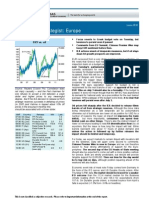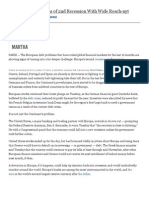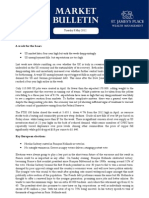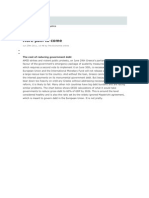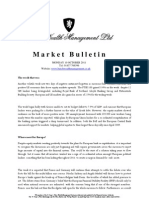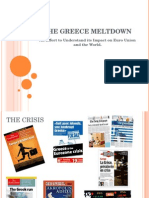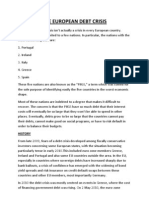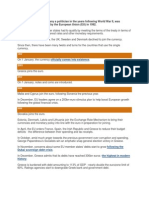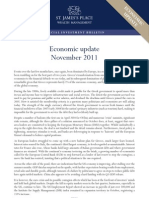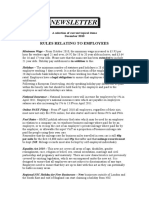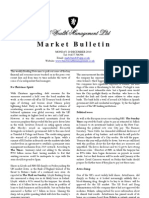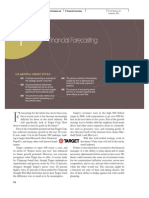Burch Wealth Mangement 20 06 11
Burch Wealth Mangement 20 06 11
Uploaded by
admin866Copyright:
Available Formats
Burch Wealth Mangement 20 06 11
Burch Wealth Mangement 20 06 11
Uploaded by
admin866Copyright
Available Formats
Share this document
Did you find this document useful?
Is this content inappropriate?
Copyright:
Available Formats
Burch Wealth Mangement 20 06 11
Burch Wealth Mangement 20 06 11
Uploaded by
admin866Copyright:
Available Formats
Market Bulletin
MONDAY 20 JUNE 2011 Tel: 01437 766396 Website: www.burchwealthmanagement.co.uk This weekly Briefing Note aims to pick out some of the key financial and economic issues touched on in the press over recent days, and from time to time includes the views of some of our independent fund managers. On a Slippery Slope A week on and nothing much seemed to have changed for investors Greeces woes still remained uppermost in peoples minds, exacerbated by nagging doubts over the strength of the global recovery. So it was no surprise that financial markets remained volatile as traders watched their screens avidly for news from Reuters or data from Bloomberg, indeed anything that would help them decide whether to sell or buy. But the week ended pretty much as it started, with the Greek sovereign debt crisis lurching onwards as the countrys politicians endeavoured to persuade its people that more pain was the only alternative. At the beginning of the week, billionaire investor George Soros criticised international authorities for not providing a solution for the eurozone debt crisis, adding that European finance ministers were basically buying time rather than tackling the problems. Whilst policymakers might have vacillated, the markets didnt and traders very quickly marked down the price of benchmark ten-year Greek bonds, thus in turn pushing up yields to a record 18% as they priced in the likelihood of Greece defaulting on its commitments. Unsurprisingly, the cost of insuring Greek debt also exploded upwards. The word default is non-PC amongst eurozone policymakers particularly in France and Germany who prefer to talk about re-profiling. Should Greece renege on its debt then the biggest losers would be French and German banks who between them own some 75% or so around 77bn of the ailing countrys debt. UK banks rank third but, fortunately, are a long way behind in monetary terms, owning some 11bn. The Sunday Telegraph reported that UK banks have pulled billions of pounds of funding from the eurozone in recent months, reflecting increased concerns about a Lehman-style event connected to a Greek default. As the week progressed, the pressure built; and at one point Greeces Prime Minister, George Papandreou, offered to resign after he lost more political support for further austerity _ measures being demanded by the EU and IMF in return for the next tranche of bailout funds. In the streets of Athens there was anger and despair that finally turned to rioting but which did have the positive effect of galvanising Nicholas Sarkozy and Angela Merkel into agreeing to meet the next day to try to break the stand-off. Equity markets bore the brunt of short-term selling as investors scurried for the safety of US and German government bonds. The pressure on European finance ministers to find a solution became an even greater imperative as fears of contagion from political and market turmoil in Greece sent Spanish borrowing costs to 11-year highs. Meanwhile, on the sidelines, Nout Wellink, the Dutch central bank governor, said Europes emergency bailout funds should be doubled (to 1,500bn) in size to convince financial markets of governments commitment to defending the euro. Such shock and awe tactics were used twice by the US government during the banking crisis, which eventually brought stability to the markets. One of the major sticking points to a solution was Germanys demand that existing private bondholders bear some of the cost of the second bailout; however, by Friday, Germany had backed down, throwing its weight behind a voluntary rollover of Greek debt, rather than a full scale debt exchange with extended maturities (which would mean losses for bondholders). Kicking the Can The news came in time to give investors a much-needed fillip, enabling equity markets to rally after several days of falls. Finance ministers and ECB officials met over the weekend and were expected to give the all-clear for Greece to receive 12bn of emergency loans that would see the crisis-hit country through to September and buy time for the authorities to agree the details of a second bailout. The Sunday Times was not so sure, though, saying the future of the eurozone was still in the balance with Greece asking for more time to implement the latest round of savage cuts demanded by the IMF/EU/ECB troika and as the battered country suffered from further waves of social unrest. However, the news today is that Eurozone finance ministers have postponed their decision on a 12bn loan to Greece
Members of the St. Jamess Place Wealth Management Group are authorised and regulated by the Financial Services Authority. The St. Jamess Place Partnership and the title Partner are the marketing terms used to describe St. Jamess Place representatives. St. Jamess Place UK plc: Registered Office: St. Jamess Place House, 1 Tetbury Road, Cirencester, GL7 1FP Registered in England Number 262806
until it introduces further austerity measures. According to the BBC, the ministers said they expected to pay the latest tranche of a 110bn EU and IMF aid package by mid-July, but that it will depend on the Greek parliament passing 28bn of new spending cuts and economic reforms. The ministers also committed to put together a second bailout package to keep the country afloat. Jean-Claude Juncker, Luxembourgs Prime Minister, who chairs the meetings of the 17 eurozone finance ministers, said that as long as the Greek parliament supported the new measures, he was certain Greece would get a second bailout. The Greek government expects a second rescue package to be similar in size to the first one (110bn) but Athens has said it needs the 12bn from the existing package by July to avoid defaulting on its debt. Belgian Finance Minister Didier Reynders said the release of that would depend on the Greek Prime Minister George Papandreou surviving a confidence vote on Tuesday. To move to the payment of the next tranche, we need to be sure that the Greek parliament will approve the confidence vote and support the programme, so the decision will be taken at the start of the month of July, he said. Less Sparkle The other thorny issue that is causing investors to fret is the direction, or rather the strength, of the global economic recovery going forward. In recent weeks the flow of economic data has been mixed and somewhat inconclusive: on the one hand, the developing economies are still growing fast; but conversely, the developed world is for the most part (excluding Germany) struggling. One thing investors like is certainty but at this point in the economic cycle clarity is lacking, adding to volatility in the markets. Firstly, the US is clearly slowing growing at a more sedentary pace than it was, with economists expecting it to grow at 1.3% in the second quarter, down from 2.2% in the first three months. Higher inflation because of rising commodity prices, particularly oil, is hurting the American consumer who in turn feels less confident; the Thomson Reuters/University of Michigan consumer sentiment index has fallen so far this month, compared with May. This drop in confidence is beginning to impact on consumer spending shops in the US saw sales fall for the first time in eleven months in May, particularly for car dealers. But whilst the US is the worlds largest economy, the 44 countries that make up the developing world account, in aggregate, for almost half of global growth and they, for the most part, are doing well. The four heavyweights are the BRIC economies, Brazil, Russia, India and China and they continue to expand. According to a report from the IMF, global growth will be 4.3% this year and 4.5% next year and, although China and India may be slowing, they will still see GDP rise by 8.2% and 9.6% respectively both down from around 10% but still very respectable. This point was made by economist David Smith, writing in The Sunday Times, who said that, whilst the global economy is slowing, the fears are probably overdone. He
pointed to temporary blips such as the effect of Japans earthquake on its own and the rest of the worlds supply chains. However, with the BRIC countries all having raised interest rates this year mostly in response to inflation remaining stubbornly above targets investors are worried that this may dampen demand too much. Surprisingly, one of the worst-performing stock markets this year, after Greece, is Hong Kong, where it seems that even there the rich are feeling less so, following the disappointing stock market flotation last week of luxury fashion house Prada. The company managed to raise only 80% of the expected $2.6bn. Steady as She Goes Whilst the US and BRIC economies may be flagging a little, the economic recovery in the UK is expected to remain on track over the coming months in the face of a deteriorating outlook for most of the eurozone. According to the closely watched leading indicators index compiled by the Organisation for Economic Co-operation and Development (OECD), Britain and Germany are on course for a stable pace of expansion, with the indicators for the UK steady at 101.6 in April (with anything over 100 indicating growth). Economist Howard Archer at IHS Global Insight said, The OECD indicator for the UK suggests the UK is headed for modest economic expansion over the coming months, with his own forecast being 1.4% for this year. Last week, figures from the Office for National Statistics showed that the number of unemployed fell by its largest margin in more than a decade, although the number of jobless rose to almost 1.5m, reflecting changes in the way those on benefits are calculated. Whilst a larger working population is welcome, one of the obstacles looking ahead is apparently a shortfall in skills which is leaving employers 3 out of 4 struggling to fill their vacancies. Markets Resolute Against the backdrop of concerns about the eurozone and the pace of global growth, stock markets have for the most part been remarkably resilient even at the end of last week there were few major upsets. The UK slipped around fifty points yet Wall Street rose by the same, whilst Paris and Frankfurt were up but the Nikkei was down. Looking back at the last six months there has been no shortage of events the Arab Spring, the Japanese earthquake, inflation, slowing global growth and the eurozone sovereign debt crisis which might have spooked investors. But, as Fidelity fund manager Tom Stevenson pointed out in The Sunday Telegraph, looking at a chart of the FTSE AllShare and allowing for the March blip, you would think that nothing of import had happened at all. Year to date the UK is down 2% but the S&P 500 has risen by the same margin as both markets trade sideways, reflecting investors assessment of events. Going forward he thought that probably one of the best strategies for investors is to focus on the high-growth parts of the world or the most defensive parts of the slower-growth countries and to be as diversified as possible by asset class and geography.
Members of the St. Jamess Place Wealth Management Group are authorised and regulated by the Financial Services Authority. The St. Jamess Place Partnership and the title Partner are the marketing terms used to describe St. Jamess Place representatives. St. Jamess Place UK plc: Registered Office: St. Jamess Place House, 1 Tetbury Road, Cirencester, GL7 1FP Registered in England Number 262806
You might also like
- U3A6 Assignment: General JournalDocument9 pagesU3A6 Assignment: General JournalBrendan Elgie50% (2)
- Football'S Back With A Dramatic Turnaround: United Stun City RivalsDocument28 pagesFootball'S Back With A Dramatic Turnaround: United Stun City RivalsCity A.M.No ratings yet
- EUs Financial CrisisDocument35 pagesEUs Financial CrisisUmar Abbas BabarNo ratings yet
- Grammar 2 Task#1Document2 pagesGrammar 2 Task#1penggemarsherinaNo ratings yet
- Financial Institutions Stare Into The Abyss: World EconomyDocument6 pagesFinancial Institutions Stare Into The Abyss: World EconomyfrankhordenNo ratings yet
- Analysis of ArticlesDocument14 pagesAnalysis of ArticlesDestiny PorterNo ratings yet
- Comprehensive Euro Zone Deal BEYOND REACHDocument4 pagesComprehensive Euro Zone Deal BEYOND REACHEKAI CenterNo ratings yet
- Daily FX STR Europe 24 June 2011Document8 pagesDaily FX STR Europe 24 June 2011timurrsNo ratings yet
- Greece Referendum News Weighs Down CommoditiesDocument5 pagesGreece Referendum News Weighs Down CommoditiesNityanand GopalikaNo ratings yet
- Europe 2.o ExtempDocument30 pagesEurope 2.o ExtempSamir ReddyNo ratings yet
- MMB 08052012Document3 pagesMMB 08052012deborah_robertsonNo ratings yet
- Record Global Stock Prices Reflect Growth of Financial ParasitismDocument2 pagesRecord Global Stock Prices Reflect Growth of Financial ParasitismShane MishokaNo ratings yet
- Cat de Benefică A Fost Înființarea U.E Pentru Europa Posibilă Temă Pentru LicențăDocument28 pagesCat de Benefică A Fost Înființarea U.E Pentru Europa Posibilă Temă Pentru LicențăCosmin Marian BecheriuNo ratings yet
- Market Bulletin: The Week That WasDocument5 pagesMarket Bulletin: The Week That WasLiz WilliamsNo ratings yet
- Kinnaras Capital Management LLC: April 2010 Market CommentaryDocument4 pagesKinnaras Capital Management LLC: April 2010 Market Commentaryamit.chokshi2353No ratings yet
- Timeline: The Unfolding Eurozone Crisis: Global EconomyDocument6 pagesTimeline: The Unfolding Eurozone Crisis: Global EconomyPiyush ChaharNo ratings yet
- The Big Swerve : 2011 Issue 16 September 15, 2011Document18 pagesThe Big Swerve : 2011 Issue 16 September 15, 2011SteveEvetsNo ratings yet
- Wealthbuilder Market Brief November 2012Document4 pagesWealthbuilder Market Brief November 2012Christopher Michael QuigleyNo ratings yet
- The Show Must Go On: Today's Market HeadlineDocument6 pagesThe Show Must Go On: Today's Market Headlineapi-148748282No ratings yet
- Greek Government Struggles After Bailout Bombshell: Avinash Tripathi 4111015015Document6 pagesGreek Government Struggles After Bailout Bombshell: Avinash Tripathi 4111015015vikramjeet_22No ratings yet
- Gress ProblemDocument7 pagesGress ProblemDr.Sameer KulkarniNo ratings yet
- The Greece Meltdown: An Effort To Understand Its Impact On Euro Union and The WorldDocument12 pagesThe Greece Meltdown: An Effort To Understand Its Impact On Euro Union and The WorldarpitloyaNo ratings yet
- Update On Europe, And... Go Ride A Bike! A Note From Willy/GeversWealth Management, LLC August 2012Document11 pagesUpdate On Europe, And... Go Ride A Bike! A Note From Willy/GeversWealth Management, LLC August 2012Gevers Wealth Management, LLCNo ratings yet
- Cedar Review July 2011Document9 pagesCedar Review July 2011Robert BrennanNo ratings yet
- Investment Compass - Summer 2011 - Europe, Earnings, and ExpectationsDocument4 pagesInvestment Compass - Summer 2011 - Europe, Earnings, and ExpectationsPacifica Partners Capital ManagementNo ratings yet
- Analysis - Four Weeks Countdown To Rescue Euro ZoneDocument4 pagesAnalysis - Four Weeks Countdown To Rescue Euro ZoneNicolas MarionNo ratings yet
- Greece DebtDocument2 pagesGreece DebtChetan MittalNo ratings yet
- Greece Crisis and The Consequences For IndiaDocument4 pagesGreece Crisis and The Consequences For IndiaAditya KharkiaNo ratings yet
- Ranges (Up Till 11.05am HKT) : Currency CurrencyDocument3 pagesRanges (Up Till 11.05am HKT) : Currency Currencyapi-290371470No ratings yet
- Global Ebrief Subject: What The Past Could Mean For Greece, JapanDocument5 pagesGlobal Ebrief Subject: What The Past Could Mean For Greece, Japandwrich27No ratings yet
- May 312010 PostsDocument25 pagesMay 312010 PostsAlbert L. PeiaNo ratings yet
- The Easy Money SaloonDocument10 pagesThe Easy Money SaloonPaul HorngNo ratings yet
- Vinod Gupta School of Management, IIT KHARAGPUR: About Fin-o-MenalDocument4 pagesVinod Gupta School of Management, IIT KHARAGPUR: About Fin-o-MenalFinterestNo ratings yet
- Politicians Around The World Welcomed The Deal - But Noted That Fast Implementation Is Now KeyDocument4 pagesPoliticians Around The World Welcomed The Deal - But Noted That Fast Implementation Is Now KeyARBITRAJ COMERCIAL -Mircea Halaciuga,Esq. aka. Mike SerbanNo ratings yet
- The Global Economy - December 19, 2012Document3 pagesThe Global Economy - December 19, 2012Swedbank AB (publ)No ratings yet
- Q&A: Greek Debt Crisis: What Went Wrong in Greece?Document7 pagesQ&A: Greek Debt Crisis: What Went Wrong in Greece?starperformerNo ratings yet
- Spex Issue 24Document11 pagesSpex Issue 24SMU Political-Economics Exchange (SPEX)No ratings yet
- Criticart - Young Artists in Emergency: Chapter 1: World Economic Crisis of 2007-2008Document17 pagesCriticart - Young Artists in Emergency: Chapter 1: World Economic Crisis of 2007-2008Oana AndreiNo ratings yet
- Stability Fund Is Not Very StableDocument4 pagesStability Fund Is Not Very StableNaimul EhasanNo ratings yet
- The European Debt Crisis: HistoryDocument7 pagesThe European Debt Crisis: Historyaquash16scribdNo ratings yet
- Daily FX STR Europe 27 June 2011Document8 pagesDaily FX STR Europe 27 June 2011timurrsNo ratings yet
- Debt CrisisDocument8 pagesDebt CrisisUshma PandeyNo ratings yet
- The Punch LineDocument17 pagesThe Punch LineSwamiNo ratings yet
- Emirates Capital Asset Management: Market Comments Market Comments Market Comments Market CommentsDocument11 pagesEmirates Capital Asset Management: Market Comments Market Comments Market Comments Market Commentsdwaynemalone1No ratings yet
- News SummaryDocument14 pagesNews Summaryapi-290371470No ratings yet
- What's The Latest?: Greece Debt Crisis Alexis Tsipras International Monetary FundDocument6 pagesWhat's The Latest?: Greece Debt Crisis Alexis Tsipras International Monetary FundsrpvickyNo ratings yet
- The EuroDocument5 pagesThe EuroSwati SinghNo ratings yet
- S&P Credit Research - Europe's Growth As Good As It Gets 2010 08 31Document6 pagesS&P Credit Research - Europe's Growth As Good As It Gets 2010 08 31thebigpicturecoilNo ratings yet
- Eurozone Crisis ThesisDocument8 pagesEurozone Crisis Thesisfjf8xxz4100% (2)
- Berita 7 Desember 2016 (Asli)Document2 pagesBerita 7 Desember 2016 (Asli)PuputNo ratings yet
- Economic Analysis EditedDocument14 pagesEconomic Analysis EditededwinyapsonNo ratings yet
- Return of The CrisisDocument15 pagesReturn of The CrisischarurastogiNo ratings yet
- 2011-06-17 LLOY Data Analysis - Greek TragedyDocument4 pages2011-06-17 LLOY Data Analysis - Greek TragedykjlaqiNo ratings yet
- Morning News Notes: 2010-05-12Document2 pagesMorning News Notes: 2010-05-12glerner133926No ratings yet
- Greek Government Debt CrisisDocument8 pagesGreek Government Debt CrisisShuja UppalNo ratings yet
- Euro Zone Crisis - A Global Problem - The HinduDocument3 pagesEuro Zone Crisis - A Global Problem - The Hindurajupat123No ratings yet
- Greece's 'Odious' Debt: The Looting of the Hellenic Republic by the Euro, the Political Elite and the Investment CommunityFrom EverandGreece's 'Odious' Debt: The Looting of the Hellenic Republic by the Euro, the Political Elite and the Investment CommunityRating: 4 out of 5 stars4/5 (4)
- Summary and Analysis of The Euro: How a Common Currency Threatens the Future of Europe: Based on the Book by Joseph E. StiglitzFrom EverandSummary and Analysis of The Euro: How a Common Currency Threatens the Future of Europe: Based on the Book by Joseph E. StiglitzRating: 5 out of 5 stars5/5 (3)
- FINAL Septic Tank LetterDocument2 pagesFINAL Septic Tank Letteradmin866No ratings yet
- Wales Coast Path Media Pack - EnglishDocument49 pagesWales Coast Path Media Pack - Englishadmin866No ratings yet
- Common Sense Risk Management of Trees National Tree Safety GroupDocument104 pagesCommon Sense Risk Management of Trees National Tree Safety Groupadmin866No ratings yet
- Proxy Voting Form-01.12Document1 pageProxy Voting Form-01.12admin866No ratings yet
- Safety in Our Hands.: Risk Management ServicesDocument16 pagesSafety in Our Hands.: Risk Management Servicesadmin866No ratings yet
- Nomination Form 2012Document1 pageNomination Form 2012admin866No ratings yet
- Burch Wealth Management 05.09.11Document3 pagesBurch Wealth Management 05.09.11admin866No ratings yet
- SWWRTP QuestionnaireDocument2 pagesSWWRTP Questionnaireadmin866No ratings yet
- Fish Week 1Document1 pageFish Week 1admin866No ratings yet
- Economic Update Nov201Document12 pagesEconomic Update Nov201admin866No ratings yet
- Burch Wealth Management 30.08.11Document4 pagesBurch Wealth Management 30.08.11admin866No ratings yet
- Pembrokeshire News: 8. The Good Beach Guide - Because Clean Seas Mean Great Beaches!Document10 pagesPembrokeshire News: 8. The Good Beach Guide - Because Clean Seas Mean Great Beaches!admin866No ratings yet
- Letter Regarding General MeetingDocument2 pagesLetter Regarding General Meetingadmin866No ratings yet
- HalfPage SPECs - Proof 7june WGDocument1 pageHalfPage SPECs - Proof 7june WGadmin866No ratings yet
- Jane Heard Newsletter 2010Document4 pagesJane Heard Newsletter 2010admin866No ratings yet
- MMB 20122010Document2 pagesMMB 20122010admin866No ratings yet
- Mark BurchDocument3 pagesMark Burchadmin866No ratings yet
- Reaction To The Comprehensive Spending Review: Special Investment BulletinDocument3 pagesReaction To The Comprehensive Spending Review: Special Investment Bulletinadmin866No ratings yet
- Final Trade Survey 2010Document148 pagesFinal Trade Survey 2010admin866No ratings yet
- Mark BurchDocument3 pagesMark Burchadmin866No ratings yet
- S 2 B Exhibitor Booking Form 2011 - Final (2) AmendedDocument1 pageS 2 B Exhibitor Booking Form 2011 - Final (2) Amendedadmin866No ratings yet
- PP New ProgDocument2 pagesPP New Progadmin866No ratings yet
- New Programme v1Document2 pagesNew Programme v1admin866No ratings yet
- Transactions 600 051949600 20220324 160153Document2 pagesTransactions 600 051949600 20220324 160153Hemanth Kumar NNo ratings yet
- Chronology of A Collapse (: 3262,00.htmlDocument5 pagesChronology of A Collapse (: 3262,00.htmlGilbert LimNo ratings yet
- Riskman SectionD Group3 Case2Document8 pagesRiskman SectionD Group3 Case2subhrajyoti_mandal100% (1)
- The Determinants of Exchange Rate in NigeriaDocument67 pagesThe Determinants of Exchange Rate in NigeriaRev. Kolawole, John ANo ratings yet
- TRT - Mod 1Document11 pagesTRT - Mod 1darkeNo ratings yet
- Westmont Bank Vs Dela RosaDocument1 pageWestmont Bank Vs Dela RosaJohn Benedict TigsonNo ratings yet
- Major B2 - Political Economy and FinanceDocument5 pagesMajor B2 - Political Economy and FinanceJoelRabiNo ratings yet
- 2017-05-16 - 12.44 - ExpectationsDocument2 pages2017-05-16 - 12.44 - ExpectationsThe Epoch TimesNo ratings yet
- G4 Practical-ResearchDocument36 pagesG4 Practical-ResearchRenz LephoenixNo ratings yet
- Itr-V: (Please See Rule 12 of The Income-Tax Rules, 1962)Document1 pageItr-V: (Please See Rule 12 of The Income-Tax Rules, 1962)Aadityaa PawarNo ratings yet
- How To Measure Innovation PDFDocument5 pagesHow To Measure Innovation PDFsunilboyalaNo ratings yet
- Capital Budgeting Decision ModelsDocument73 pagesCapital Budgeting Decision ModelsJhagantini PalaniveluNo ratings yet
- Cot 1-Computation of Gross ProfitDocument24 pagesCot 1-Computation of Gross ProfitRuffa L100% (1)
- Industrial Enterprises Act NepalDocument55 pagesIndustrial Enterprises Act Nepalsm789No ratings yet
- City of Windhoek: Application & Cancellation For Direct DebitingDocument2 pagesCity of Windhoek: Application & Cancellation For Direct Debitingknowledge4self WiseCONANo ratings yet
- Debt SecuritisationDocument16 pagesDebt SecuritisationAbhishek SinghNo ratings yet
- Relig AreDocument5 pagesRelig AresomnathNo ratings yet
- Chapter 19 HWDocument4 pagesChapter 19 HWAarti J. KaushalNo ratings yet
- Damri AR 2017Document155 pagesDamri AR 2017TITA ANJARNINGSIH 1No ratings yet
- Insurance Law ProjectDocument14 pagesInsurance Law Projectlokesh4nigamNo ratings yet
- (123doc) - De-Thi-He-Thong-Thong-Tin-Kinh-DoanhDocument8 pages(123doc) - De-Thi-He-Thong-Thong-Tin-Kinh-DoanhTrần Minh HoàngNo ratings yet
- Https:ocw - Mit.edu:courses:15 401 Finance Theory I Fall 2008: - MIT15 - 401F08 - Lec01Document21 pagesHttps:ocw - Mit.edu:courses:15 401 Finance Theory I Fall 2008: - MIT15 - 401F08 - Lec01Kk HhNo ratings yet
- Compound Interest Type 1 To Type 7 by Aditya Patel SirDocument4 pagesCompound Interest Type 1 To Type 7 by Aditya Patel SirShubhank ShuklaNo ratings yet
- Managerial FinanceDocument25 pagesManagerial FinanceEng RaniaNo ratings yet
- Quarterly Remittance Return: of Creditable Income Taxes Withheld (Expanded)Document1 pageQuarterly Remittance Return: of Creditable Income Taxes Withheld (Expanded)Jun Jr FloresNo ratings yet
- Siam Makro: Your Trusted PartnerDocument9 pagesSiam Makro: Your Trusted PartnerWorakit ChutimaratNo ratings yet
- 677261-Foundations of Financial Management Ch04Document28 pages677261-Foundations of Financial Management Ch04pcman92No ratings yet
- The Anatomy of The Forex Market - Pepperstone InfographicDocument1 pageThe Anatomy of The Forex Market - Pepperstone Infographicadmin2919No ratings yet
- 3 Case Analysis Problem and FormatDocument6 pages3 Case Analysis Problem and FormatKristine MorillaNo ratings yet







